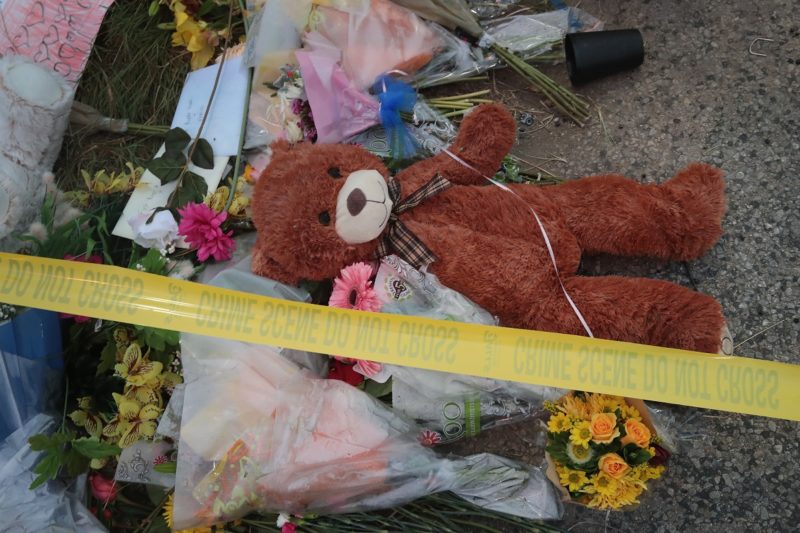Mental Health and Guns: Journalists Aren’t Asking the Right Questions
If politicians are going to respond to questions about policy solutions to mass shootings with “It's a mental health issue,” then journalists need to take that reply seriously and ask follow-up questions.

A gunman murdered at least 26 people and wounded 20 others at a church in Sutherland Springs, Texas, on Sunday.
Americans have become used to asking, “Which one?” when people mention a mass shooting. We’re used to the post-shooting routine, probably even find some sort of freakish comfort in it: breaking news, coverage of police response, video clips of shocked residents sobbing “I can’t believe this happened here,” and then the total number dead and the total number injured.
We expect to see a vigil or two, network anchors interviewing heroes or brave loved ones, and then a hashtag will trend: “[insert city or college here] Strong.” Next, politicians offer thoughts and prayers, while hushing any discussion of policy change and playing their part of ignore-and-redirect to perfection.
Rinse and repeat.
Coverage of Sutherland Springs has followed that familiar formula. When journalists asked President Trump about the Sutherland Springs shooting, he dismissed the idea that guns were a factor and instead blamed the massacre on mental health issues. Specifically, Trump called the shooting a “mental health problem at the highest level.”
And they let him get away with that?
We’ve almost reached a frequency of mass shootings where flags are just going to stay at half-mast, and the response by people with the power to do something is that this is a mental health issue, followed by the sound of crickets.
(Steps up on soapbox.)
Here are some of the problems with the mental health issue pivot.
Most people with mental health diagnoses are not violent. In fact, only 3 to 5 percent of violent acts can be attributed to people living with a serious mental illness.
Increased access to mental health care could help millions in the United States, but experts say it would do little to address mass shootings.
So, if we’re going to go down the mental health problem road, then we need to walk it for real. Meaning, if politicians are going to call mass shootings a mental health problem, reporters must challenge them to back that allegation up with data and, when they fail to provide data, call politicians out for perpetuating stigma in an effort to dodge their responsibility to address gun violence.
Importantly, journalists need to recommit to asking follow-up questions that get politicians walking the walk for real.
I’ve got some suggestions for how that conversation might go.
Politician:
More regulations won’t solve anything. This is really a mental health issue.
Journalists:
Do you plan to propose legislation requiring a mental health evaluation for gun ownership?
How will you determine which mental health diagnoses will bar an individual from gun ownership?
What policies will you support and how much money will you devote to mandate adequate mental health coverage in health-care insurance?
How long will a person who fits your predetermined definition of unfit-to own-a gun-mental-illness be barred from gun ownership?
Will there be a database of people deemed unfit to own a gun? How secure will it be? How will you maintain privacy? What if a person gets treatment and then wants to own a gun?
What level of mental health professional will be allowed to make this call? Will said professional be employed by the state or federal government?
Does this path seem efficient to you given the weak link between mental illness and mass murder, as current scientific-based research does not support this claim?
On what data are you basing the allegation that mass shootings are a mental health issue? Do you plan to introduce legislation to fund Centers for Disease Control and Prevention research of gun violence as a public health issue?
I could go on and on.
At this point, I’m less annoyed with politicians using this bullshit pivot than I am with journalists letting them get away with it. If politicians are going to respond to questions about policy solutions to mass shootings with “It’s a mental health issue,” then journalists need to take that reply seriously and ask the follow-up questions that would quickly expose just how full of shit that response is. Maybe that’s harsh; after all, journalists aren’t the ones who have blocked gun control on Capitol Hill time and time again. But I’m tired of watching those with access to government officials fail at asking basic clarifying questions that would better inform the public and help hold politicians accountable.
The same public that now casually discusses active shooter trainings at schools and workplaces deserves a serious discussion of the facts by those who have the power to actually do something. We deserve vigorous coverage by journalists with the courage to ask politicians hard questions and demand real answers. Until then, thoughts, prayers, candles, vigils, articles about heroes followed by #Hashtag Strong, followed by survivor profiles, then recovery segments … rinse and repeat.
(Steps off soapbox and spits.)
